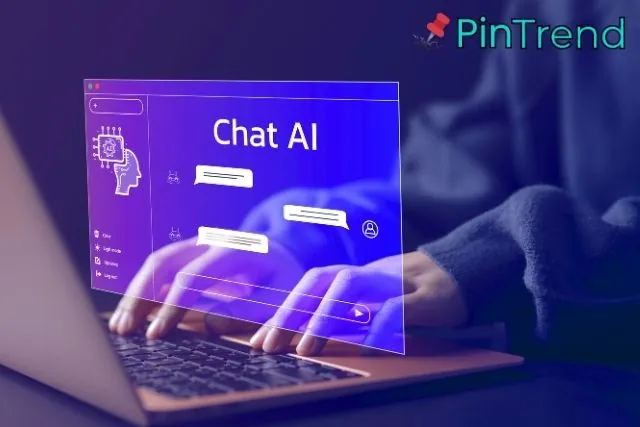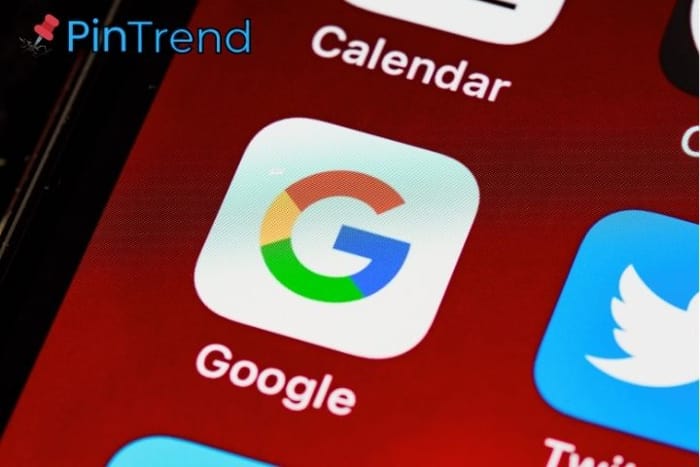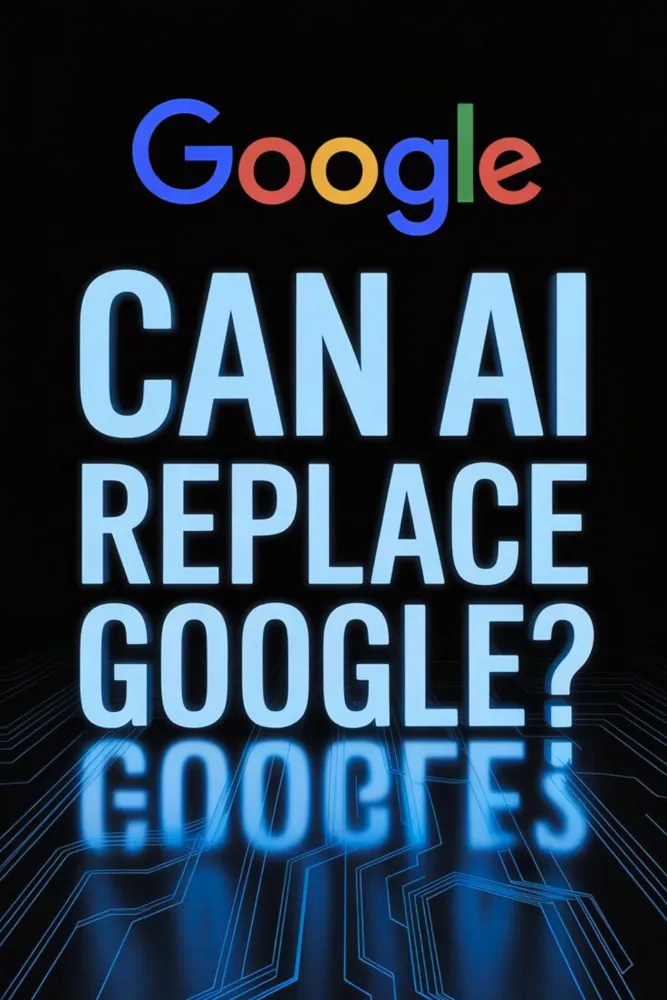Introduction — The Big Question About AI vs. Google
The rise of AI-powered search engines has sparked a global debate: can AI replace Google? For over two decades, Google has defined the way we explore the internet, from crawling and indexing billions of pages to delivering personalized results in seconds. But with breakthroughs in generative AI platforms, conversational assistants, and AI vs Google search comparisons dominating discussions, the search landscape is changing fast.
Tools like ChatGPT, Perplexity, and Bing AI showcase how AI replacing traditional search may no longer be just speculation—it’s becoming a possibility. As Google vs AI technology intensifies, the real question is not if AI will replace Google, but how both might coexist in the future.

Why the debate matters now
AI isn’t new, but its mass adoption in everyday search is. According to recent reports, AI-driven search adoption statistics show millions of Americans are already turning to AI alternatives to Google like Perplexity, You.com, and Bing AI. These tools promise quick answers vs multiple pages, something that appeals to a fast-paced, mobile-first generation.
How AI is reshaping the way we search
Traditional engines focus on keyword search. By contrast, conversational AI search powered by natural language processing (NLP) in search interprets queries like human conversation. Instead of scrolling through ten links, you get AI-generated summaries of search results in seconds. It feels efficient, personal, and almost futuristic.
AI vs. Google — What’s the Difference?
At its core, the battle of AI vs Google search boils down to method and experience.
How traditional search engines work
Google’s search is built on crawling and indexing billions of web pages. When you search, its algorithms rank pages by relevance, authority, and context. A typical Google crawling and indexing process includes:
| Stage | What Happens | Example |
|---|---|---|
| Crawling | Google bots discover web pages | Finds a new blog post |
| Indexing | Pages are analyzed & stored | Adds to Google index |
| Ranking/Serving | Results shown in SERP | Displays top 10 links |
Google excels at local search and Google Maps, handling navigational queries and serving human-curated search results at scale. But it can also feel like information overload in Google search.
How AI-powered search (ChatGPT, Perplexity, Gemini, etc.) works
Instead of relying solely on links, AI-driven search assistants use large language models (LLM) trained on vast data. They generate tailored responses with AI, often conversational and context-aware. Tools like Perplexity or Neeva AI focus on understanding intent, not just keywords.
This approach leads to semantic search vs keyword search. For example, ask Google “best laptops for students,” and you’ll get 10 blue links. Ask AI-powered browsing engines the same, and you’ll get a structured answer with pros, cons, and recommendations.
Strengths and weaknesses of each
-
Google strengths: accuracy, trust, massive index, real-time crawling.
-
AI strengths: speed, summaries, personalization, AI-powered browsing.
-
Disadvantages of AI search engines: hallucinations, limited citations, trustworthiness of AI search engines still questioned.
Put simply, it’s not about Google vs AI chatbots replacing each other—it’s about how they complement or compete.

Why Google Still Matters in the AI Era
Despite the buzz, Google isn’t going anywhere soon.
Google’s massive data index and ecosystem
Google’s market dominance is staggering: over 90% share in mobile search. Its ecosystem spans Gmail, YouTube, Maps, Ads, and Android. This data advantage means AI replacing traditional search outright is unlikely.
Trust, accuracy, and brand dominance
For many, Google equals credibility. Its fact-checking processes, data privacy in search engines policies, and billions invested in security give it a trust edge over newer AI replacing search engines challengers.
User habits and behavior
People are creatures of habit. Decades of daily use have ingrained Google into culture, from voice search vs AI search queries with Google Assistant to routine commercial searches tied to Google Ads ecosystem. That kind of loyalty is hard to disrupt.
Can AI Overtake Google Search?
The million-dollar question: will AI kill Google?
Current limitations of AI search
AI tools can feel magical but aren’t flawless. Limitations of AI-powered search include shallow sourcing, outdated training data, and occasional unreliability. This leads to AI hallucinations in search results, where the system confidently states incorrect facts.
AI hallucinations vs. Google’s fact-checking
Google has a huge advantage in search accuracy and misinformation control. Its algorithms weigh trust signals, backlinks, and authority. Meanwhile, AI replacing human-curated search results often misses nuance. A human vs machine search results gap still exists.
Speed, personalization, and conversational experience
Still, AI wins on experience. It’s faster, conversational, and highly personalized. AI replacing Google pros and cons come down to whether users value speed over reliability.
Will ChatGPT or AI search engines replace traditional search?
The short answer: not yet. But the fact that people are asking “Will ChatGPT replace Google search?” proves how fast the evolution of search technology is moving.

The Future of Search Engines — AI + Google Integration
Google isn’t waiting to be disrupted—it’s building AI in.
Google’s AI-powered updates (Search Generative Experience, Gemini, etc.)
Projects like Search Generative Experience (SGE) and Google generative AI (Gemini, AI Overviews) aim to keep users inside Google by providing direct answers.
What is Google Gemini AI in search?
Google Gemini AI in search blends multimodal learning (text, images, video). It’s a clear move to counter AI alternatives to Google like Bing AI.
How AI is already part of Google Search
From predictive queries to AI-driven ranking systems, Google already embeds AI in every search. The future of online search is not Google or AI—it’s Google AI integration.
Future of Google with artificial intelligence — evolve or be replaced?
Google has no choice but to evolve. Its survival depends on balancing AI replacing traditional search trends with its Google Ads ecosystem revenue stream.
Impact of AI Search on Content and SEO
If you run a website, this is the section you can’t ignore.
Informational queries and AI answers
AI excels at informational queries, giving AI-generated vs human-generated results in seconds. But these AI-driven search assistants often bypass websites, raising concerns for publishers.
Transactional and navigational queries — where Google still dominates
When money’s on the line, Google wins. Commercial search and ads remain Google’s fortress. AI hasn’t yet cracked buying intent at scale.
How AI search engines affect SEO rankings
As AI replacing Google pros and cons shake out, one risk is AI-driven search assistants giving AI-generated summaries without credit. That could reduce traffic.
How websites should adapt (content depth, EEAT, structured data)
To survive, websites must embrace EEAT (Experience, Expertise, Authoritativeness, Trustworthiness), structured data, and content depth. AI in digital marketing demands SEO strategies aligned with how AI extracts and ranks information.
How will AI change the future of SEO?
Expect impact of AI on SEO and websites to grow. Optimizing for search intent in AI vs Google will become as critical as classic keyword targeting.

Scenarios Where AI Could Replace Google
AI might not dethrone Google globally, but in niches it can.
Explorational and research-based searches
For research-based queries, AI search engine benefits and drawbacks tilt toward AI. It reduces time spent scanning multiple links.
Personalized learning and recommendations
Think tutoring or shopping suggestions. Here, personalized search experience and tailored response with AI shine.
Direct Q&A instead of browsing multiple sites
This is where AI replacing traditional search looks real. Why click 10 sites when an AI summary gives the answer?
Pros and cons of AI replacing Google
-
Pros: fast, conversational, personalized.
-
Cons: ethical concerns in AI search, misinformation, lack of transparency.
Why AI Won’t Fully Replace Google (At Least Not Soon)
Google’s resilience shouldn’t be underestimated.
Trust and reliability factors
In an era of search accuracy and misinformation in AI, Google’s authority matters. Trustworthiness of AI search engines is still under scrutiny.
Commercial search and ads
Billions in ad revenue ensure Google won’t walk away from search. AI vs Google Ads ecosystem is one of Google’s strongest defensive walls.
Regulatory and ethical considerations
From copyright to bias, ethical concerns in AI search raise red flags. Governments may regulate AI replacing search engines faster than expected.
Can AI take over Google’s market share?
Yes, partially. But Google’s market dominance and ecosystem make a total takeover unlikely in the short term.
The Path Forward — AI and Google Coexisting
The future isn’t AI versus Google. It’s AI and Google coexisting.
Opportunities for users and businesses
Users gain AI-powered browsing convenience, while businesses must rethink AI in digital marketing strategies.
Future search habits and ecosystem changes
Expect a hybrid model where AI-driven ranking systems guide the top of results, and human-curated search results remain valuable for depth.
Preparing your strategy for an AI-first search world
Publishers should invest in structured data, multimedia, and authority-driven content. The future of AI and search coexistence rewards adaptability.
Conclusion — Can AI Replace Google?
Short answer and long-term outlook
So, will AI replace Google search in the future? Not entirely. AI will reshape search, maybe even overtake Google in certain areas, but Google’s infrastructure, trust, and scale ensure survival.
How users should adapt to the evolving search landscape
For now, expect a future of online search where Google integrates more AI, while independent AI-powered search engines carve niches. As a user or website owner, your best move is to adapt early, stay flexible, and embrace the evolution of search technology.
Frequently Asked Questions
Can Google be replaced by AI?
Not in the near future — AI can complement search, but Google’s ecosystem and trust keep it dominant.
What cannot be replaced by AI?
Human judgment, creativity, ethics, and critical thinking remain beyond AI’s reach.
Why is Google failing in AI?
Google isn’t failing — it’s adapting with Gemini, SGE, and AI tools, but slower rollout makes it seem behind.
Which AI is better than Google?
No AI fully surpasses Google yet, but ChatGPT, Perplexity, and Bing AI offer unique strengths in conversational search.
Is AI more accurate than Google?
Not always — Google ensures fact-checking, while AI offers speed and personalization but risks hallucinations.


